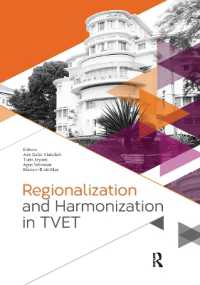Full Description
Welfare states around the globe are changing, challenged by the development of knowledge economies. In many countries, policy-makers' main response has been to modernize welfare states by focusing on future-oriented social investment policies that focus on creating, mobilizing, and preserving human skills and capabilities. Yet, there is massive variance in the development of social investment strategies.
The World Politics of Social Investment: Welfare States in the 21st Century is the first of two volumes of the World Politics of Social Investment (WOPSI) project, which systematically maps and explains different welfare reform strategies in democratic countries around the world. This volume develops a theory on the political and socio-economic conditions for the development of social investment policies around the globe, and studies the impact of the main explanatory factors on the empirical variety of social investment reforms (and non-social investment reforms). It also proposes a new typology of different welfare reform strategies, distinguishing nine types of social investment strategies depending on their functions (creating, mobilizing and preserving human skill and capabilities) and their distributive profiles (inclusive, stratified or targeted), and three types of non-social investment welfare strategies (market liberalism, social protectionism and basic income). The chapters of this volume are written by leading social policy scholars from different disciplines and countries, who apply the WOPSI global theoretical framework in a range of contexts and policy fields, shedding light on the scope conditions of social investment, as well as political demand- and supply-side drivers of social investment reforms. This volume on its own or in conjunction with the second volume is an invaluable resource on the state of modern welfare and social investment policies from around the globe.
Contents
1. Towards a Worldwide View on the Politics of Social Investment
Bruno Palier, Julian L. Garritzmann, Silja Häusermann
2. The Politics of Social Investment: A Global Theoretical Framework
Silja Häusermann, Julian L. Garritzmann, Bruno Palier
Part I: The Ideational Context of Social Investment Politics
3. Multiple Sources of the Social Investment Perspective: The OECD and the World Bank
Jane Jenson, Rianne Mahon
4. The Politics of European Union Social Investment Initiatives
Caroline de la Porte, Bruno Palier
Part II: The Political and Economic Scope Conditions of Social Investment Reforms
5. Social Investment and Social Assistance in Low- and Middle-Income Countries
Armando Barrientos
6. Political Linkage Strategies and Social Investment Policies: Clientelism and Educational Policy in the Developing World
Haohan Chen, Herbert Kitschelt
7. State Capacity and Social Investment: Explaining Variation in Skills Creation Reforms in Latin America
Juan Bogliaccini, Aldo Madariaga
8. The Emergence of Knowledge Economies: Educational Expansion, Labor Market Changes, and the Politics of Social Investment
Julian L. Garritzmann, Silja Häusermann, Thomas Kurer, Bruno Palier, Michael Pinggera
Part III: Demand for and Supply of Social Investment - Public Opinion and Social Partners' Social Investment Policy Preferences
9. Employers and Social Investment in Three European Countries: The Good, the Bad and the Ugly
Emmanuele Pavolini, Martin Seeleib-Kaiser
10. Social (Investment) Partners? Trade Unions and the Welfare State for the Knowledge Economy
Niccolo Durazzi, Leonard Geyer
11. Trade Unions, Labor Market Dualization, and Investment in Early Childhood Education and Care in Latin America
Melina Altamirano, Bárbara Zárate-Tenorio
12. Public Preferences Towards Social Investment: Comparing Patterns of Support Across Three Continents
Björn Bremer
Part IV: The Comparative Politics of Social Investment Reforms
13. Social Investment and Neoliberal Legacies in Latin America: Breaking the Mold?
Evelyne Huber, Claire Dunn, John D. Stephens
14. Different Paths to Social Investment? The Politics of Social Investment in North-East Asia and Southern Europe
Margarita Estévez-Abe, Margarita León
15. Social Investment or Childcare on the Cheap? Quality, Workforce, and Access Considerations in the Expansion of Early Childhood Education and Care
Kimberly Morgan
16. The Politics of Social Investment in the Knowledge Economy: Analytical Insights from a Global Comparison
Julian L. Garritzmann, Silja Häusermann, Bruno Palier








